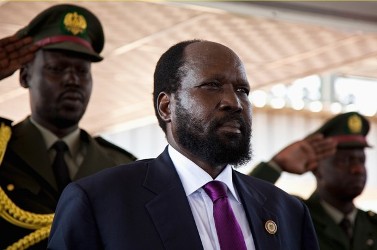Kiir directs governors to tell citizens benefits of cooperation agreement with Sudan
October 19, 2012 (JUBA) – President Salva Kiir Mayardit has directed the Governors of South Sudan’s ten stated to conduct extensive public lecturers to explain the benefits of the cooperation agreement he signed on 27 September with Sudanese president Omer Ahmed El Bashir, apparently in an attempt to diffuse tensions and public criticism over the deal .

The buffer zone security map was put forward the African Union High Level Implementation Panel (AUHIP) who are mediating between the Sudan and South Sudan, which gained independence in July last year.
The protests have taken place despite the location of the buffer zone, according to AU and UN Security Council having no bearing on the final demarcation of the border or the status on contested areas.
However, leading government officials and civil right activists who are from the Dinka Malual ethnic group in Northern Bahr el Ghazal have rejected the deal as Mile 14. The critics of the deal say that Mile 14 was never mentioned in the any previous deal between Sudan and South Sudan or on the 2005 Comprehensive Peace Agreement (CPA).
The CPA paved the way for South Sudan to vote to separate from Sudan last year. Protestors also argued that the area was not part of any claimed or disputed areas included in the post referendum and now secession disputes. The deal allow
But President Kiir and his negotiators have countered that the deal is just a temporary security arrangement and called on state governors to help him explain it in simple and comprehensible language to the citizens so that they understand the benefits which the deal brings to the country.
This comes days after the president held a close door meeting with governors of the states. Madut Dut Yel, Deputy Governor of Northern Bahr el Ghazal attended the meeting on behalf of Governor Paul Malong Awan, who was the first and highest ranking official to reject the deal.
Yel returned to Aweil, capital of Northern Bahr el Ghazal on Wednesday with Kiir’s message. Speaking to cabinet members on his arrival at Aweil airport Yel said that he told President Kiir “that our people are not happy with inclusion of the 14 mile area in the safe demilitarized buffer zone because it lies deeply inside our territory south of [the] Kiir River but the president said the agreement was just a temporary security arrangement.”
The deputy governor added that “the meeting equally agreed and directed the state governors to conduct extensive education and explain to the citizens in order to remove fears and worries relating to security arrangements and four freedoms which appear to have generated a lot of concerns from members of the general public”.
Pagan Amum Okiech, the South Sudan’s lead negotiator at the talks on Thursday evening said in a televised statement on South Sudan Television confirmed that President Kiir had directed his ten governors to educate their citizens.
“Demilitarization of the 14 mile area is one of the areas of concerns among the people of Northern Bahr el Ghazal State. These concerns have been addressed. The governors have endorsed it and they will now go and explain it to the citizens.
“Civic education would remove worries that have been developed of either misunderstanding or confusion caused by people who have not read the agreement and confusing the security arrangement with the status of disputed and claimed areas”, Amum explained.
President Kiir on Wednesday in high level meeting with different level of various groups and prominent political leaders from the area said his administration would never give away an inch of area’s claimed by the new nation to Sudan.
Amum, who is the Secretary General of South Sudan’s ruling party, said that the deal was a prerequisite requirement for the resumption of oil production and exports to the international markets through territory of neigbouring Sudan.
(ST)
